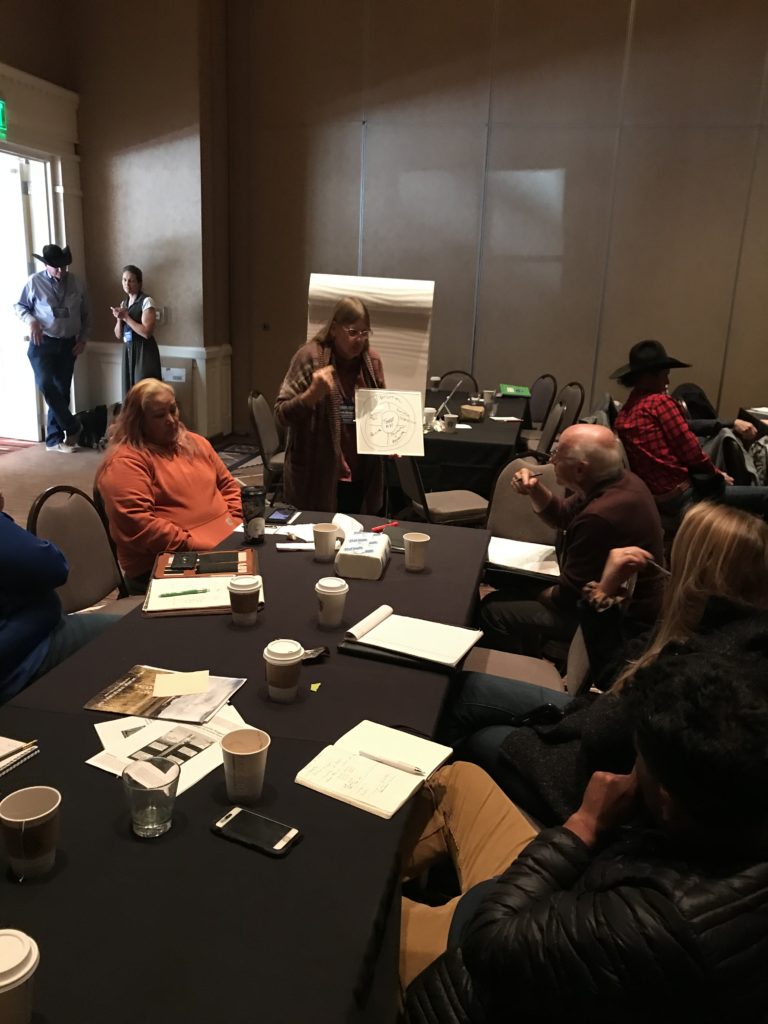On November 22, 2019, after 2 full days of the Regenerate 2019 conference, 47 conference attendees gathered with a dozen of HMI's experienced educators to work in small groups on how to improve profitability of regenerative grazing practices. The diverse group of participants ranged in experience from folks who were just curious and wanting to get started in regenerative grazing to agency and service providers, tribal representatives, and highly experienced producers.

The participants came looking for help with barriers and challenges ranging from access to land, capital, or labor, relationship issues: personal self discipline, family harmony, clarity of goals, and ranch succession; soil health: parasite control, wildlife, multi-species issues, drought planning, dealing with weeds, lack of diversity; financial management: marketing and business planning, profitability, managing diverse enterprises and paying for infrastructure costs.
HMI Certified Educators worked in small groups to help attendees identify weak links in their enterprise’s chain of production (whether they need to focus on resource, product conversion, or marketing) to ensure that they focus on barriers that will give the best return on investment of time and resources. A small group of beginners got a crash course in basic Holistic Management principles and the importance of developing a holistic goal or context.
A group of CEs helped many address resource concerns with discussions on soil health, focusing on pasture recovery time, decreasing bare ground/increasing organic litter, and increasing biodiversity. There were discussions on using multi-species, stock density, bale grazing, cover cropping, increasing number of paddocks, and use of keyline techniques with side sessions focusing on infrastructure issues.
HMI Certified Educators Graeme Hand, from Australia, and Kelly Sidoryk, from Canada, helped people resolve issues with product conversion weak links and then took a deeper dive into a number of other Holistic Management principles and practices.
Cindy Dvergsten and Angela Boudro, Certified Educators from Colorado and Oregon respectively, helped a group address marketing and business planning weak links with discussions on creating a value proposition and identifying an ideal customer profile. Cindy urged producers to focus on benefits their products bring to customers encouraging them to define how their products address their potential customer’s needs, wants, and fears. They also touched on the different challenges in serving different markets from wholesale, restaurants, end consumer etc.

The final sessions for the day focused on action items - helping participants identify their next steps once they return home from the conference. A big part of this discussion centered on the idea of creating low cost, small scale "safe to fail" trials on their land to see first hand the kind of response they could get, and many of the participants left ready to start these small trials.
Additional key learnings included implementing ideas or information participants learned at the workshop on: budgeting, creating a business plan, improving lease agreements, learning more about soil health, trying out new marketing ideas, reducing fertilizer inputs with management of livestock, parasite control in sheep, identifying and addressing their weak link, and even using ducks to improve land health!
Results:
What are the most useful things you learned in this course?
"To use a practice area to test/prove practices, stocking density, return periods, etc.
Sheep parasite management stratagies.
Importance of planning and identifying goals.
Basic strip grazing practices and goal setting.
Weak link identification and Drill-down plans.
To be flexible. What works for one does not work for all.
Planning for profit. Identifying financial weak link.
Planning for Profit.
Different perspectives and Networking.
Help on deciding what the next step is and then doing it.
Okay to have fail areas and Financial planning.
Better understanding of weak links. Lots of specific ideas to solve small problems. Encouragement to follow through with some practices to improve our soil--i.e. mob grazing and use of small test plots.
Reinforced some practices I am using
Developing a marketing strategy.
Cattle breed that will eat available forage."
Special thanks to our Funder - Thornburg Foundation
This tailored training could not have been possible without the generous help of our HMI Certified Educators who brought their time, attention, experience, and wisdom to share: Joel Benson, Angela Boudro, Lauri Celella, Deborah Clark, Cindy Dvergsten, Kirk Gadzia, Guy Glosson, Graeme Hand, Blain Hjertaas, Roland Kroos, Kelly Sidoryk, and Ralph Tate.
We are grateful for our collaborators: Quivira Coalition, Stockman Grassfarmer, Dry Creek Livestock, Boudro Enterprises, Whole New Concepts, Holistic Effect, Resource Management Services, Crossroads Ranch Consulting, KW Cattle Co, Birdwell & Clark Ranch, Hand for the Land, All Things Natural
